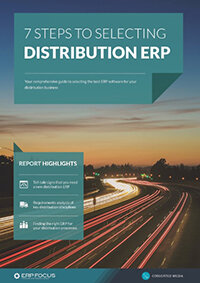Supply Chain, ERP and the Multinational Company
If your ERP package supports international operations, and if you engage in international operations, then you will likely recognize a significant increase in control and capability as a result of implementing ERP in a multinational organization. Not all of that improvement will come from the actual software; some will accrue from things like standardizing on one system, better master data organization, standardizing global processes, and so on.
Things that ERP supply chain software will improve, and that you should ask about during the sales cycle, are relatively seamless handling of currency and currency-related issues; more complete data requirements for constructing export documentation (although the ability to produce that documentation out of the box varies greatly); the ability to handle Value Added Taxes effectively; and provisions for expressing measurements in both English and metric units. If your international logistics needs include bonded warehouses, insist on your vendors putting someone in front of you who has successfully implemented a bonded ERP solution.
Benefits of (ERP) Globalization
Standardizing globally on one ERP software system creates efficiency gain opportunities in the supply chain. Capacity planning is more robust with the ability to better utilize capital assets, no matter where they are located. Customer service inquiries, such as order status, can be handled anywhere, simultaneously increasing service while decreasing cost. The old burden of managing interplant orders in two different systems disappears.
Better organization of master data can include requiring product category and Harmonized Tariff Schedule numbers for each sku (note – HTS classification is not for the faint of heart or weak of mind, so look before you leap). Alternate units of measure increase flexibility in reporting and documentation. Trade agreement compliance is a little bit more sophisticated, but may be available as a piece of master data and so should be included in your ERP supply chain master data decisions.
Process standardization is a painful benefit. The benefits are pretty tangible – reduced global training costs, similar jobs are performed similarly, no matter where they are located, and process improvements can be engineered globally, as opposed to region by region. The pain occurs because the path to standardization means that regional differences must be eliminated, and each of those differences is believed to be vastly superior to the other regions’ process. The ultimate key to reaping the most out of standardization is to engage the global supply chain group into creating a vision of standardized, but world-class performance. If you settle for just standardization as the goal, you may very well find yourself standardized around mediocrity.
Calculating and paying import duties is typically a third party software application, since there is a need for constant updating of tariff rates as trade negotiation is a non-stop process. Likewise, most transportation planning is either done by a third party or via third party software rather than as an integral part of an ERP system.
There is not as much certainty today as there was ten years ago that globalization is an irresistible force in manufacturing. Still, it is difficult for a company today to grow beyond a certain size without becoming multinational. For a multinational company with ERP, supply chain skills in international logistics are essential.
Featured white papers
-

7 steps to selecting distribution ERP
Get expert advice on distribution ERP selection and requirements analysis
Download
Related articles
-
![How ERP can help prevent demand forecasting headaches [Image by pugphai on Freepik] How ERP can help prevent demand forecasting headaches [Image by pugphai on Freepik]](/pictures/W1siZiIsIjIwMjQvMDkvMDUvM202dXNqMm5xMF9Ib3dfRVJQX2Nhbl9oZWxwX3ByZXZlbnRfZGVtYW5kX2ZvcmVjYXN0aW5nX2hlYWRhY2hlc19JbWFnZV9ieV9wdWdwaGFpX29uX0ZyZWVwaWtfLmpwZyJdLFsicCIsInRodW1iIiwiNDAweDI2NiMiXSxbInAiLCJlbmNvZGUiLCJqcGciLCItcXVhbGl0eSA4NSJdXQ/How%20ERP%20can%20help%20prevent%20demand%20forecasting%20headaches%20%5BImage%20by%20pugphai%20on%20Freepik%5D.jpg?sha=dfaa04291c359173)
How ERP can help prevent demand forecasting headaches
Learn about the ERP tools which can help improve your demand forecasting and the supply chain pro...
-

CMMC Compliance: What Aerospace and Defense Manufacturers Need to Know
Key insights on CMMC compliance, deadlines, and securing DoD contracts with CMMC 2.0 certificatio...
-

How to Track Your Supply Chain with ERP
Find out how you can use supply chain ERP to effectively monitor the upstream and downstream supp...

